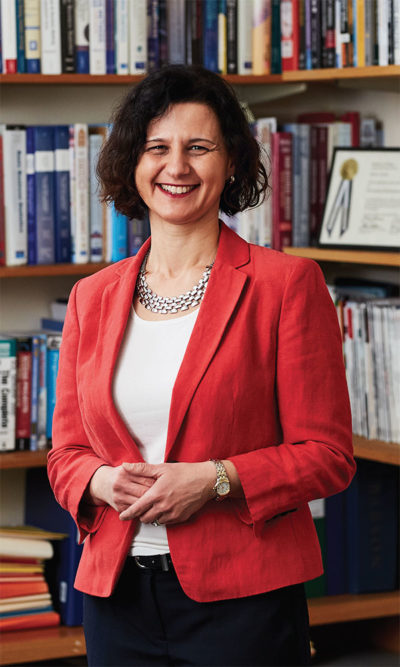Dessislava Pachamanova grew up in Bulgaria in a time of upheaval.

Photo: Pat Piasecki
Dessislava Pachamanova
Much of her childhood was spent in the capital of Sofia, an old city full of both beautiful architecture and ugly Soviet-style apartment buildings. In the late 1980s, as the Berlin Wall fell and Bulgaria’s longtime Communist leader stepped down, Pachamanova felt optimistic about the future. She witnessed thousands of compatriots singing songs and waving flags in huge gatherings. “It was a time of hope,” says the professor of analytics and computational finance. “We all wanted change. It was inspiring.”
Then that promise evaporated. Bulgaria’s economy collapsed, and hyperinflation was rampant. She watched as her grandparents lost all their hardearned savings. “It was a tumultuous time,” says Pachamanova. “Life was difficult.” Those experiences, of uncertainty and weariness, of lost aspirations, have stayed with her. “It changed how I look at the world,” she says. “You learn nothing is permanent. Everything is transient. What matters is your experience. I wanted to invest in learning and experiences.”
That realization led Pachamanova to leave Bulgaria, study in Italy and then the U.S., and eventually embark on an academic career. She came to Babson in 2002, and since then she has helped to shape the College’s offerings for business analytics. “I’m happy with where I am,” says Pachamanova, holder of the Zwerling Family Endowed Research Chair. “I’m learning all the time.”
After she left Bulgaria, Pachamanova’s first stop was Italy. At the age of 16, she was one of five Bulgarians to win a scholarship to attend one of the United World Colleges, a system of schools across the globe. For two years she studied in northeastern Italy, in a town on the Adriatic Sea, with students who came from some 60 countries. “You learn about cultural differences,” Pachamanova says. “It made me more considerate of how people feel about things, and how we have a lot in common.”
During that time, Pachamanova would travel to nearby Slovenia to help out in two refugee camps filled with people fleeing war in the former Yugoslavia. Pachamanova played basketball with the camps’ children and taught them English. She was trying to give them a sense of normalcy. “They didn’t know what would happen next,” she says. “I remember taking little souvenirs to the kids, and I remember them being so excited.” Pachamanova became friends with a girl from Bosnia. “Here we were, two girls of the same age who had a lot in common,” Pachamanova says. “But she faced this really difficult future in a refugee camp.”
After studying in Italy, Pachamanova received a scholarship to Princeton University and came to America toting her one suitcase. “It was difficult at the beginning,” says Pachamanova, who often felt left behind in conversations. She was grateful for a patient roommate who explained the many cultural references she was missing. “I understand at a personal level what international students go through,” Pachamanova says. She decided to major in mathematics, following the lead of family members, including her grandfathers, who were accountants, and her parents, who were engineers.
Pachamanova then pursued a doctorate in operations research at the MIT Sloan School of Management. While in grad school, she wasn’t sure what to do for her career, so she took time to consult for a German bank and accepted a trial position at Goldman Sachs. She also taught courses at MIT, and her husband, whom she had met at Princeton, noticed something. “I’ve never seen you as happy as when you teach,” he told her. Pachamanova agreed. After she finished her doctorate, she started at Babson.
Pachamanova teaches courses on analytics and computational finance, and she continues to invest in a life of learning and experience. Her philosophy is to add something new to her syllabuses every semester. “My obligation to my students is to be constantly learning,” she says. Pachamanova also has helped to define and expand what Babson teaches in the classroom. In 2009, she co-authored with other College faculty a white paper that outlined Entrepreneurial Thought & Action, the methodology balancing decision-making and analysis that remains a guiding principle for Babson today.
In 2012 and 2013, she was part of a faculty team that designed concentrations in business analytics for the undergraduate and graduate schools. “We thought there was a gap in the curriculum,” says Pachamanova, who also serves as faculty advisor to students in the business analytics clubs. “Nowadays, a business degree is not complete without an understanding of analytics. Data is everywhere.” The concentrations have proven popular with students, and Pachamanova has co-led the design of a master’s degree in business analytics, which will launch in the fall. To differentiate it from other degree programs, she says, it will emphasize business analytics in an entrepreneurial world.
Outside the classroom, Pachamanova is a mom to 7-year-old twins. “I find it’s such a privilege to watch them grow and learn and figure out who they will be,” she says. Pachamanova tries to teach them Bulgarian and every year takes them on a trip to the country she once called home. “I want them to see it’s a real place and feel comfortable there,” she says. “I want them to have real memories of going there.”
Pachamanova admits feeling disconnected from her homeland. “I say I’m from Bulgaria, but I lived there as a child, and it’s changed a lot since,” she says. But her experiences, and how they shaped her, remain with Pachamanova. As a professor, she values that her learning has never ended. Her students, in particular, are a source of education. “I learn from them every day,” she says. “That’s the greatest thing about my job. I’m amazed by what they can do.”
